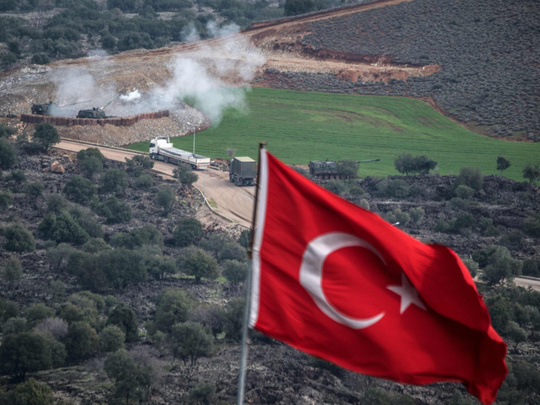
London: Russia gave Turkey the greenlight to attack Kurdish-controlled enclaves in northern Syria on the condition that those areas be handed over to the Syrian army once the Kurds were defeated, a source in Turkey’s Ministry of Foreign Affairs told Gulf News on the condition of anonymity.
During the meeting that took place two days before the operation began, Russia agreed to evacuate its military personnel from the Menagh airbase, which was assaulted by Turkish fighter jets on Saturday.
The revelation has sparked speculation that the operation’s peculiar name —Operation Olive Branch — is in fact meant for the Syrian government.
Turkey, under the leadership of Recep Tayyip Erdogan, has supported rebel forces against Syrian President Bashar Al Assad’s government since the war broke out in 2011.
The new operation could be the first step towards normalisation between the two rivals.
Relations between Syria and Turkey collapsed in the infant stages of the ongoing crisis. Syria shot down a Turkish F-4 Phantom jet after it violated Syrian airspace, killing both pilots.
With President Al Assad’s position looking increasingly secure, Erdogan may be coming to terms with this reality, and could potentially be looking to restore ties with Syria, to not only counter their mutual enemy – Kurdish separatists – but to also bolster bilateral post-war trade, and facilitate the return of refugees in Turkey back to Syria.
Even if Erdogan isn’t looking to normalise diplomatic relations with Damascus, it still makes sense for him to return Afrin to the Syrian Army as a show of goodwill towards Russia, which is playing an increasingly large role in mediating between Ankara and the Syrian government, via the Sochi process.
Turkey and Russia, who were also supporting opposite sides of the conflict, restored relations in 2016 and have since maintain close communication and coordination.
Turkey is targeting the US-backed fighters at a time when ties with ally Washington appear close to breaking point.
Turkey sees the YPG as an extension of the outlawed Kurdistan Workers Party (PKK) which has carried out a deadly, three-decade insurgency in Turkey’s mainly Kurdish southeast.
The United States is backing the YPG in Syria, seeing it as an effective partner in the fight against Daesh.
Ahead the the assault, the Syrian government warned Turkey against launching the military operation and said Syrian air defenses stood ready to defend against such an attack.
However, now it seems the statement by deputy foreign minister Faisal Mekdad was empty rhetoric.
Both Turkey and the Syrian government are against the emergence of an autonomous Kurdish region.
A Kurdish referendum in favour of independence in September in Iraq was dealt a sharp blow by Iraqi forces who quickly defeated Kurdish fighters.
Their indepedence declaration was later rescinded after massive pressure by neighbouring countries—Turkey, Iraq and Iran.
The US—the Kurds closest ally—warned Kurds against such a move and did not come to their defense.












